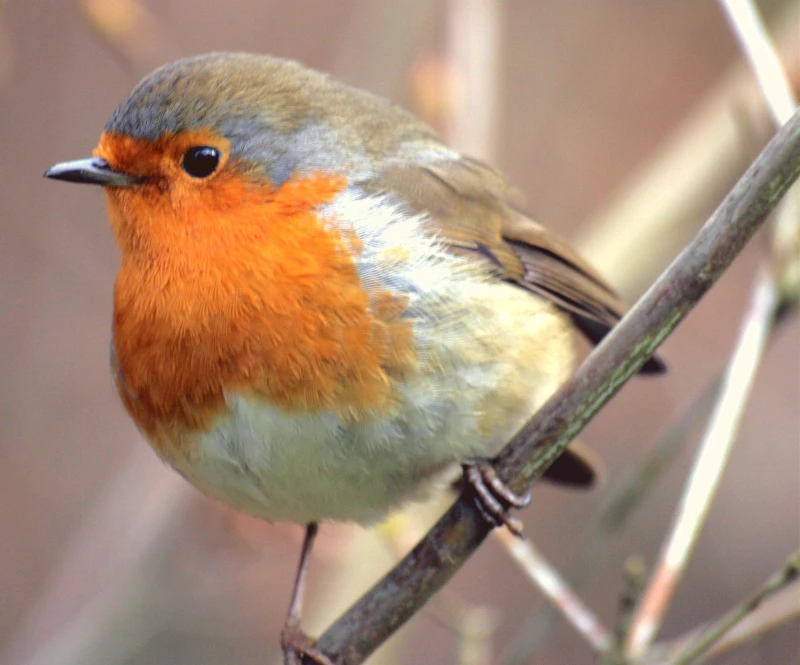If you’ve ever seen a robin bird, chances are you’ve been charmed by its adorable appearance and cheerful chirping. But did you know that the robin bird also holds significant meaning and symbolism in various cultures and traditions? In this comprehensive guide, we’ll explore the robin bird meaning and spiritual symbolism, answering some of the most commonly asked questions about this beloved feathered friend.

What is the meaning of the robin bird?
The robin bird meaning can vary depending on context and culture, but some common interpretations include:
Hope and Renewal
The robin bird has been associated with hope and renewal for many years, particularly in Western cultures. This belief is rooted in the fact that robins are often one of the first birds to appear in spring, when the snow begins to melt and the flowers start to bloom once again. Because of this, they have become a symbol of the end of winter and the beginning of new life.
In addition to their appearance at the start of spring, robins also have a striking red breast which has led some to associate them with the color of love and passion. This association with love and renewal has further strengthened the idea that robins are a symbol of hope and new beginnings.
Robins are also known for their beautiful song, which is another reason why they are so beloved in many cultures. Their cheerful melody is often seen as a sign of joy and optimism, and it’s not uncommon to hear people say that hearing a robin sing can lift their spirits and bring a sense of peace and contentment.
Interestingly, the belief that robins represent hope and renewal is not limited to just Western cultures. In Japan, for example, robins are considered to be a symbol of good luck and happiness. In some Native American cultures, the robin is believed to represent growth and transformation.
Good Luck and Abundance
The robin bird has long been associated with good luck and abundance, particularly in Western cultures. This association may stem from the bird’s bright, cheerful appearance and its close connection to springtime and new growth.
In many cultures, the robin is seen as a harbinger of spring, arriving just as the weather begins to warm and the first signs of new life appear. Its arrival is often viewed as a positive sign for the future, signaling the end of winter and the beginning of a new season filled with growth, renewal, and opportunity.
Additionally, the robin’s bright red breast has symbolic significance in many cultures. In some traditions, red is associated with prosperity, passion, and good fortune, making the robin a popular symbol of abundance and prosperity.
Joy and Cheerfulness
The robin bird is a small passerine bird that is commonly found in gardens, parks, and woodlands throughout Europe, North America, and Asia. In many cultures, the robin bird has long been associated with happiness and positivity.
One reason why the robin bird is associated with happiness is its appearance. With its bright red breast and cheerful song, the robin is often seen as a symbol of hope and joy. In some cultures, the robin is even believed to be a messenger of good news and a harbinger of spring.
In addition to its physical traits, the robin bird’s behavior also contributes to its association with positivity. Robins are known for their friendly and curious nature, and they are often seen hopping around gardens and parks in search of food. They are also known for their resilience, as they are able to withstand harsh winters and thrive in a variety of different habitats.
Given these positive attributes, it is not surprising that the robin bird has become a popular subject in art, literature, and folklore. In many stories, the robin represents happiness, love, and loyalty. For example, in the classic children’s book “The Secret Garden,” the robin plays a key role in helping the main character find happiness and healing.
What is the spiritual meaning of the robin bird?
In addition to its cultural significance, the robin bird also has spiritual symbolism in many traditions. Some common interpretations include:
Transformation and Rebirth
In many cultures, the robin bird is seen as a symbol of transformation and rebirth, commonly associated with the arrival of springtime. This connection may be due to the bird’s habit of nesting and breeding during the spring season, which represents a time of renewal and growth after a period of dormancy.
For centuries, the robin bird has been featured in folklore and mythology across many cultures, often representing themes of new beginnings, hope, and renewal. In some traditions, the robin is even believed to possess magical powers, such as the ability to bring good luck or ward off evil spirits.
In addition to its symbolic significance, the robin is also valued for its ecological role in many ecosystems. As an insectivore, the robin helps to control populations of insects and other small creatures, playing an important role in maintaining the balance of local food webs.
Overall, the robin bird represents a powerful symbol of transformation and rebirth, reminding us of the cyclical nature of life and the importance of embracing change and growth. Whether we view the robin as a spiritual guide, a source of ecological balance, or simply a beautiful and uplifting presence in our lives, there is no denying the profound impact that this beloved bird has had on human culture and imagination throughout history.
Messenger of the Divine
In many cultures, the robin is seen as a symbol of renewal and new beginnings. Its bright red breast is said to represent the life force, and its arrival in springtime marks the end of winter and the beginning of new growth and rebirth. The robin’s distinctive song is also believed to have a powerful spiritual significance, and some people believe that hearing it can bring good luck or even prophetic visions.
In addition to its association with renewal and new beginnings, the robin is also believed to be a messenger from the spiritual realm. Many people report seeing robins around the time of important life events, such as the birth of a child or the death of a loved one. Some even believe that the robin is a form of communication from their deceased loved ones, bringing messages of comfort and reassurance from beyond the grave.
The robin’s behavior is also thought to hold spiritual significance. For example, some people believe that a robin tapping on a window or flying into a house is a sign of impending death or other serious events. Others interpret the robin’s habit of building nests near homes as a sign of good luck and blessings for the family living there.
Overall, the robin bird has long been associated with spiritual symbolism and is believed by many to be a messenger of the divine. Its appearance, behavior, and song are all seen as signs and omens from the spiritual realm, bringing messages of renewal, new beginnings, and comfort to those who need them most.
Connection to the Ancestors
The robin bird has long been associated with a connection to the ancestors, and this belief is deeply rooted in many cultures around the world. One of the reasons for this association is the bird’s close association with springtime, which is often viewed as a time of renewal and rebirth. In many cultures, spring is also seen as a time of reconnecting with one’s roots and heritage, both figuratively and literally.
In many Native American cultures, for example, the robin bird is seen as a symbol of new beginnings and a connection to the ancestors. According to legend, the robin was the first bird to sing after the great flood that washed away the old world, and its song was a sign of hope and renewal for those who had survived. In other cultures, the robin is believed to be a messenger from the spirit world, bringing messages of guidance and wisdom from ancestors who have passed on.
Another reason why the robin bird is associated with the ancestors is its bright red breast. In many cultures, the color red is closely linked to blood and the life force, and it is also associated with fire and passion. The robin’s red breast, therefore, may be seen as a symbol of the life force that connects us all to our ancestors and to the natural world.
What does it mean when a robin bird visits you?
If a robin bird visits you, it may be a sign of its spiritual symbolism and meaning in your life. Here are a few interpretations:
Positive Change and Transformation
A visit from a robin bird may be a sign that positive change and transformation are on the horizon for you. This could involve anything from a new job or relationship to a personal growth journey.
Connection to the Divine
A visit from a robin bird may also be a sign that you are being guided or supported by the divine. This could involve a spiritual awakening or a deeper connection to your intuition and inner wisdom.
Message from the Ancestors
In some cultures, a visit from a robin bird may be seen as a message from the ancestors, indicating that you are on the right path and should continue to follow your calling.
Conclusion
Whether you’re a bird enthusiast or simply appreciate the beauty and symbolism of the robin bird, there’s no denying its significance in various cultures and traditions. From representing hope and renewal to serving as a messenger of the divine, the robin bird holds a special place in our hearts and minds. So next time you hear the sweet melody of a robin’s song or catch a glimpse of its bright red breast, take a moment to appreciate the magic and wonder of this beloved feathered friend.
In summary, the robin bird meaning and spiritual symbolism are multifaceted and can vary depending on context and culture. However, some common interpretations include hope and renewal, good luck and abundance, joy and cheerfulness, transformation and rebirth, messenger of the divine, and connection to the ancestors. There are also many ways to incorporate the robin bird into your spiritual practice, such as meditation, tarot readings, and ritual offerings.
Whether you believe in the spiritual symbolism of the robin bird or simply appreciate its beauty and charm, there’s no denying that this feathered friend holds a special place in our hearts. So next time you see a robin, take a moment to appreciate all that it represents and the joy it brings to the world.

Hey there! I am Salena Snyde, a dream psychologist with over 10 years of experience. I am the primary author of the Dream Meanings section on Impeccable Nest, where I not only share in-depth knowledge about the nature, function, and significance of dreams but also connect with readers through profound articles and quality information. With passion and a diverse knowledge of dreams, I have established strong connections with dream experts worldwide by reading articles and studying leading books on the subject. I believe that the combination of personal insights and sharing from the dream expert community can provide the most profound and comprehensive understanding for everyone.
